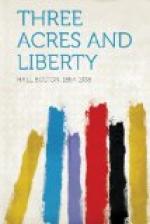CHAPTER IV
VACANT CITY LOT CULTIVATION
In this book, necessarily, we have to take much upon the reports of others, checking them by our own judgment and experience. The startling accounts of what has been done and is being done on plots of about a quarter acre to each family, however, can be easily re-verified by any one who will go or write to Philadelphia, or examine any present experiment or model gardens. These show what can be done even by unskilled labor, with hardly any capital, on small plots where the soil was poor, but which are well situated.
The directors say: “The first Vacant Lot Cultivation Associations were organized when relief agencies were vainly striving to provide adequate assistance for the host of unemployed. The cultivation of vacant city lots by the unemployed had already been tried successfully in other cities. The first year we provided gardens, seeds, tools, and instruction only, for about one hundred families on twenty-seven acres of ground. At a total cost to contributors of about $1800, our gardeners produced $46,000 worth of crops.”
The applicant is allowed a garden on the sole condition that he cultivate it well through the season, and that he do not trespass upon his neighbors. He must respect their right to what their labor produces. A failure to observe these rules forfeits his privilege.
During twenty years, more than eight thousand families have been assisted, many old people who could no longer keep up the rapid pace of our industrial life, cripples whose physical condition held them back in the race for work, persons who on account of sickness or other misfortunes have been thrown out of the competition in modern business, and unfortunate beings who, though clear in mind and strong in muscle, have been forced to the ranks of the unemployed—these have all had an opportunity opened to them: opportunity to enjoy all of the fruits from nature’s great storehouse which their own labor and skill might secure.
The war has forced France, Italy, and England similarly to utilize natural opportunities for subsistence in their enormous tracts of unproductive lands. In Mexico all proprietors will be required to designate what they propose to cultivate and the remainder will either be allotted temporarily for agricultural purposes to those desiring them or it will be cultivated under government management. There is no remedy like that for poverty.
The first man who applied for a vacant lot garden came to the Philadelphia office after the announcement in the papers, so weak and emaciated that the doctor was afraid the poor fellow would be unable to get out of his office without assistance. He was a widower with three girls and a boy, the oldest girl about seventeen.
He received a garden which contained only about one fifth of an acre. Later he observed that a part of another little farm was left untouched on account of being very rough, full of holes, and covered with stone and bricks. Part of this farm was below the street grade and subject to overflow, but it was larger than the others—nine tenths of an acre. He offered to exchange, saying he did not mind the extra work.




